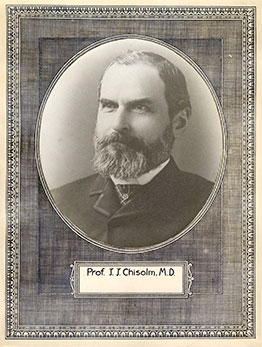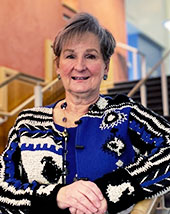Since 2003, May has been designated as Healthy Vision Month. It is a month set aside to educate people on the importance of eye care and regular eye exams. It seemed appropriate during this month to look back on the University of Maryland School of Medicine’s (UMSOM) history in the education of diseases of the eye and ophthalmology.
Dr. George Frick and Early Ophthalmology at UMSOM
In 1824, Dr. George Frick, published “A Treatise on the Diseases of the Eye,” the first title published on ophthalmology in the United States. The work became so important that by 1825 it was made a required reading for licensure by the Medical and Chirurgical Faculty of Maryland (MedChi). Dr. Frick was born in Baltimore in 1793 and earned his medical degree from the University of Pennsylvania in 1815. He began practicing ophthalmology in Baltimore in 1819 and is believed to be the first ophthalmologist in the United States.
Dr. Frick’s connection with UMSOM began in 1822, when he began delivering clinical lectures at the Maryland Hospital. He was also Ophthalmic Surgeon at the Baltimore General Dispensary, where he established the first Eye Dispensary in Baltimore in 1824. When the School of Arts and Sciences was founded at the University of Maryland in 1830, Dr. Frick was named chair of Natural History. Unfortunately, by 1840 Dr. Frick left the medical profession as he was becoming deaf. He spent the remainder of his life in Europe and died in Dresden, Germany on March 26, 1870. His nephew, Dr. Charles Frick, UMSOM Class of 1845, was professor of Materia Medica at the University from 1858 to 1860.
From 1868 to 1869, the first clinics on the diseases of the eye were offered at the Baltimore General Dispensary by Dr. Russell Murdock. Dr. Murdock was the first surgeon to perform a cataract extraction unassisted. He was also an inventor of several instruments used in eye surgery and exam.

Dr. Julian J. Chisolm, First Chair of Diseases of the Eye and Ear at UMSOM
By 1873, the UMSOM created the first chair in the nation for the diseases of the eye and ear (a precursor of today’s UMSOM Department of Ophthalmology); Dr. Julian John Chisolm was named to the position. Dr. Chisolm was born in Charleston, South Carolina on April 16, 1830. He attended and graduated from the Medical College of the State of South Carolina in 1850 and continued on to Europe to further his medical studies in London and Paris. He returned to South Carolina and founded a preparatory medical school in Charleston with Dr. Francis T. Miles (later UMSOM professor of Anatomy and clinical professor of Nervous Diseases, 1868-1880 and professor of Physiology, 1880-1903). By 1858 Dr. Chisolm was named professor of surgery at the Medical College of the State of South Carolina.
When the Civil War broke out in 1861, Dr. Chisolm joined the Confederate States Army (CSA) as a surgeon, where he wrote a Manual of Military Surgery. The manual was so popular it went through four editions (1861-1864) during the Civil War. It taught surgeons in the CSA to treat wounds and establish field hospitals, and to manage medical and food supplies and hygiene.
Following the Civil War, Dr. Chisolm came to Baltimore (1868), where he became professor of Military and Operative Surgery at UMSOM. By 1869, he was chair of Operative Surgery, had created a clinical professorship of the diseases of the eye and ear, and was Dean of the Medical Department (a position he held until 1874).
In 1871, Dr. Chisolm founded the Baltimore Eye and Ear Institute. In its first year, the institute treated 2000 patients from all parts of the United States. It was located on West Franklin Street. The institute was founded by Maryland Law (Chapter 467, April 1874) and Dr. Chisolm was named the surgeon in charge. The law appropriated $1000 (the equivalent of $23,565.90 today) to the institute to care for six patients at a time who could not afford to pay.
By 1877, the Institute was already experiencing such high demands that it needed a larger building and additional support to treat poor patients; thus, the Presbyterian Eye, Ear and Throat Charity Hospital was formed. As the name suggests, this hospital was better equipped to help the poor who could not afford to pay for services. The hospital was located on East Baltimore Street. Dr. Chisolm served as Chief Surgeon and, through his leadership, the Presbyterian Eye, Ear and Throat Charity Hospital became one of the best ophthalmic hospitals in the country.

A big proponent of clinical education, Dr. Chisolm gave UMSOM students weekly clinics on eye and ear diseases. The students also had ample opportunity for internships and work in both the Baltimore Eye and Ear Institute and the Presbyterian Eye, Ear and Throat Charity Hospital.
In 1895, Dr. Chisolm’s health concerns necessitated his retirement from teaching. He was named emeritus professor of Eye and Ear Diseases following retirement. In 1898 he moved to Petersburg, Virginia. He died November 1, 1903. His son, Dr. Francis M. Chisolm (UMSOM Class of 1889) continued in his father’s footsteps serving as surgeon at the Presbyterian Eye, Ear and Throat Hospital following Dr. J. Chisolm’s retirement, and as associate professor of ophthalmology at the University.
Drs. Frick and Chisolm paved the way for the future of eye education at UMSOM. The Department of Ophthalmology at UMSOM is one of the oldest in the nation and has a proud history of impressive educators and innovative breakthroughs in eye surgery and care.
References and Further Reading:
Cordell, Eugene F. The Medical Annals of Maryland, 1799-1899… Williams & Wilkins: Baltimore, 1903: http://hdl.handle.net/10713/12582
Department of Ophthalmology and Visual Sciences. “Department History.” University of Maryland School of Medicine Website: https://www.medschool.umaryland.edu/ophthalmology/Department-History/
Friedenwald, Harry. “The Early History of Ophthalmology and Otology in Baltimore (1800-1850).” Johns Hopkins Hospital Bulletin. Nos. 77-88; Aug-Sept. 1897: https://collections.nlm.nih.gov/ext/dw/101491115/PDF/101491115.pdf
In Honor of Julian John Chisolm, M.D…. 1930: http://hdl.handle.net/10713/3441
University of Maryland School of Medicine. 200 Years of Medicine in Baltimore: Outstanding Contributions of the University of Maryland Medical Alumni and Faculty. 1976: http://hdl.handle.net/10713/4798
University of Maryland School of Medicine Annual Bulletins, 1838-1880: http://hdl.handle.net/10713/2619













